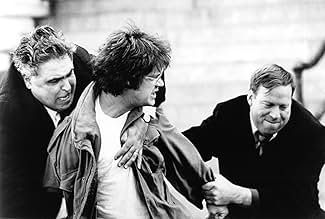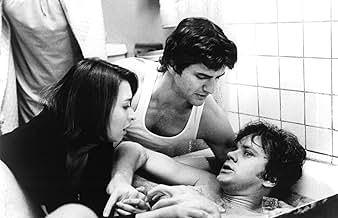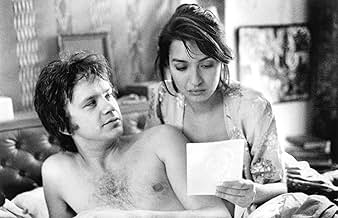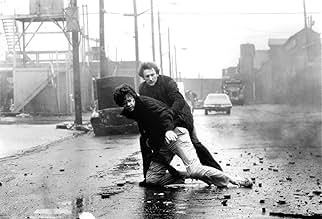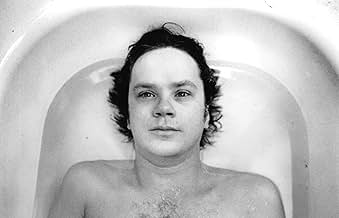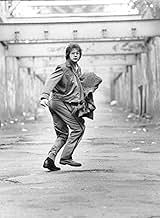En deuil après la mort de son enfant, un ancien combattant hanté par la guerre du Vietnam tente de percer les secrets de son passé tout en souffrant de dissociation. Pour ça, il doit disting... Tout lireEn deuil après la mort de son enfant, un ancien combattant hanté par la guerre du Vietnam tente de percer les secrets de son passé tout en souffrant de dissociation. Pour ça, il doit distinguer la réalité de ses rêves et illusions.En deuil après la mort de son enfant, un ancien combattant hanté par la guerre du Vietnam tente de percer les secrets de son passé tout en souffrant de dissociation. Pour ça, il doit distinguer la réalité de ses rêves et illusions.
- Réalisation
- Scénario
- Casting principal
- Récompenses
- 3 victoires et 1 nomination au total
Avis à la une
Tim Robbins is Jacob Singer, a warm and genuinely likable Vietnam veteran who, in spite of earning an advanced doctoral degree, chooses to find employment working for the U. S. Postal Service. We learn in bits and pieces as the plot unfolds that his service in Vietnam included a very frightening battle, and the events set in motion on that fateful day parallel what could be his descent into madness.
Jacob's life suddenly begins to resemble Hell. He is literally chased by confusion, fear, and death, he sees unbelievably terrifying images, has horrific experiences that whether real or imagined are too frightening to bear alone. His only comfort comes in the form of the woman he lives with, Jezzie (the late Elizabeth Peña), and his chiropractor, Louis (Danny Aiello). Each of these people's relationships with Jacob represent more than just the roles they fulfill in his life-they are absolute forces at battle for his sanity, and possibly even his soul.
His torment begins to include the past as well, the undeniable love he still has for his ex-wife and painful memories of his son Gabe, who died tragically in an accident (played by a young Macauley Culkin). As all these elements of the past, present and future collide in shocking hallucinations, Jacob slowly begins to suspect he could be the victim of a secret Army drug experiment gone terribly wrong.
With a haunted desperation, he embarks on a journey to find out what on earth happened to him-only his visions / flashbacks / flashforwards have become so delusional that reality and fantasy are hopelessly interwoven and nothing is as it seems. All that is decipherable is good and evil, life and death. And at the end of his nightmare, all he has to do is choose.
That's all I will share of the story. I'm not going to do you the disservice of spoiling the experience this movie is. Suffice it to say, there is much more to know, and nothing left to tell.
Meanwhile, there is not enough that can be said of Robbins' performance. Although he has had "more important" film roles, never before or since has Robbins portrayed naked human emotion so effortlessly and without artiface; though this will not be his most remembered role, it is his personal best to date. Also in top form is director Adrian Lyne. Likewise, Jacob's Ladder is by far his personal best, though he may remain better known for his other more commercially successful films, such as Fatal Attraction and 9 &1/2 Weeks.
Jacob's Ladder is not a horror movie as some may deduce; It is human drama, masterfully disguised as a supernatural thriller. The basic elements of Jacob's Ladder have been plundered several times over the past few decades by technicians such as as Shyamalan who aspire (but fail) to be artists, and franchises like The Conjuring that aspire (but fail) to be art. We have been suckered by flashy films with clever plot twists that cheat us on story, characters, and technical excellence, and in so doing we have lost the discovery of real feelings while the lights flicker before us.
Films such as Jacob's Ladder are set apart from the rest of the pack because you don't just watch stuff like this, you feel it too.
However, the film's plot is often confusing and difficult to follow, which made it challenging for me to fully grasp the narrative's intentions. The frequent shifts in reality and dream sequences, while innovative, can come off as disjointed and leave me feeling more perplexed than engaged. Additionally, the film's pacing feels uneven, with some scenes dragging on and others rushing through crucial developments.
In summary, Jacob's Ladder offers intriguing psychological horror and a compelling performance by Robbins but suffers from a confusing plot and inconsistent pacing that can detract from the overall experience.
This is a great movie of a personal nightmare. It's a very good performance of a paranoid character from Tim Robbins. Some of the images are actually quite disturbing. It may be the first time that I noticed the shaking head effects. The long nightmare does meander a little. It's hard to expect hallucinations to drive a straight line to a destination. The final reveal is problematic and pulls the rug from the rest of the movie.
Jacob Singer is a postal worker, who, through the brutal effects of Vietnam, mentally breaks down, and starts seeing demons following him, killing his friends, raping his wife...... Make no mistake, Jacobs Ladder is a grim film but behind its dark mask lies an uplifting message of hope, freedom and mental release. I wont say anymore, because spoiling the plot for you would be extremely horrible of me, who am i to take away the magic of seeing the film from you.
I'm not going to say that this is accessible to everyone, its not in the least. If your favourite film is American Pie than turn away, this is REAL film making. A lot of people will not like this, because they will expect, like with most films, to have all the answers served to them on a plate. Jacobs Ladder requires the viewer to do the thinking, letting them have their own perceptions of the film rather then being fed that of the directors. If you do choose to go on Jacobs journey with him be warned, it wont always be pretty, but you will come out of it gratified that for once in film you have the freedom to think for yourself.
It has a highly intelligent plot though not difficult or artsy and is void of cliches. It therefore confuses and aggravates many viewers and professional reviewers always wanting a standard has-it-all Hollywood outpouring.
It is so few films that leaves room for independent thoughts. Jacob's Ladder tumbles your mind the same way a dream of your own does. I have never felt this effect in a film so strong before. The images comes pouring in and your brain tries to make sense of it. Whenever you think you have a grasp it slides away again.
The brilliance of the progression of the story, twists and turns, and the final explanation, so obvious but elusive as real dreams are, makes it on par with the best of Kubrick.
Le saviez-vous
- AnecdotesAll SFX were filmed live, with no post-production. For example, to achieve the famous 'shaking head' effect, director Adrian Lyne simply filmed the actor waving his head around (and keeping his shoulders and the rest of his body completely still) at 4fps, resulting in an incredibly fast and deeply disturbing motion when played back at the normal frame-rate of 24fps.
- Gaffes(at around 27 mins) To match the direction of movement, a shot of the Ford LTD racing around a corner has been flipped, but the license plate, which is now in reverse, is visible.
- Citations
Louis: Eckhart saw Hell too. He said: The only thing that burns in Hell is the part of you that won't let go of life, your memories, your attachments. They burn them all away. But they're not punishing you, he said. They're freeing your soul. So the way he sees it, if you're frightened of dying and... and you're holding on, you'll see devils tearing your life away. But if you've made your peace, then the devils are really angels, freeing you from the earth. It's just a matter of how you look at it, that's all. So don't worry, okay? Okay?
- Crédits fousThe credits roll over a grainy black and white photo of Gabe and Jacob crossing the street together.
- Versions alternativesAfter initial test audiences reported that the film was overwhelming, director Adrian Lyne cut out twenty minutes of material, almost all of which came from the last third of the film. Four major sequences were removed after Jacob first meets Michael; a scene where Michael gives him an antidote for the Ladder, a scene where Jacob thinks he is cured but turns out not to be; a scene where he goes to Michael's apartment and finds Michael decapitated; and a scene just prior to his final meeting with Gabe, where he meets Jezzie, who shows her true form.
- ConnexionsFeatured in Siskel & Ebert & the Movies: Silent Classics (1990)
- Bandes originalesLady Marmalade
By Bob Crewe (as B. Crewe) / Kenny Nolan (as K. Nolan)
Published by Kenny Nolan Publishing / Tannyboy Music / Stone Diamond Corp. (BMI)
Performed by LaBelle
Courtesy of CBS Records
Meilleurs choix
Détails
Box-office
- Budget
- 25 000 000 $US (estimé)
- Montant brut aux États-Unis et au Canada
- 26 118 851 $US
- Week-end de sortie aux États-Unis et au Canada
- 7 500 760 $US
- 4 nov. 1990
- Montant brut mondial
- 26 118 851 $US
Contribuer à cette page




